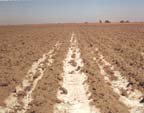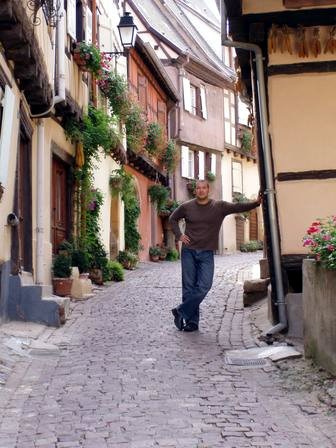
A few years ago, I was hiking with my parents & youngest brother and sister in Colorado's Rocky Mountain National Park. We could see the high peaks in an arc above us, capped with snow even in the height of summer, forming the Continental Divide.
"The snow on this side of the divide all flows into the Mississipi Delta," my brother told us. They had learned about this in his Junior High Geography class over the past year.
"So where does the snow on the other side end up?" my father quizzed him.
After a few puzzled minutes, he admitted he wasn't quite sure. "I don't exactly remember, but it goes to the Pacific, I think. The Colorado River?"
"LA," I said, smiling. "It actually mostly ends up going to Los Angeles." Which wasn't exactly true, but not too far from the truth.
I had been reading a copy of "Cadillac Desert," a fantastic book that covers the water policy in the Western US over the past 75 years or so, in all of its absurdity. I was amazed to learn about the government building hundred-million dollar water projects in the West so that farmers here get free or cheap water to grow the same crops that the government is also paying farmers in the southeast and midwest to plow under; the fact that the thirst of Los Angeles, San Diego, Phoenix, and the Imperial Valley had placed so many demands upon the Colorado River that it ceased flowing into the Gulf of California, destroying a historically rich estuary and the accompanying ecosystem; the destruction of a rich Salmon fishery in the American and Sacramento rivers through diversions and dams.
This morning, a story caught my ear on NPR's Morning Edition. It was about many fish species experiencing severe population decline over the past three years due to diversion of water from the Sacramento River Delta. One of the species involved was the Delta Smelt, listed as an Endangered Species, which could potentially trigger reductions in the flow of water for irrigation purposes.
KLC and I just returned from visiting great friends in Sacramento over the Thanksgiving holiday. The five hour drive to Sac parallels the amazing California Aqueduct through the San Joaquin Valley. Millions of acres of farmland stretch for hundreds of miles; cotton, pistachios, citrus, row crops, almonds, stock yards, grapes, poultry barns, alfalfa, dairy units, and every other imaginable agricultural product. In addition, hundreds of cities, large and small, depend on this aqueduct both for municipal drinking water and for economic stability and purpose.
Much of this abundance would not be possible without the water projects. The value of the crops produced in the Westlands Water District every year is upwards of $30 Billion. 2/3 of the cities in California depend to some degree on this water, diverted from the Sacramento and American rivers. The story said that during the months of November, December, April, May, and part of June, the Westlands Water district supplies 95% of the salad greens consumed in the United States! And all of this despite the fact that many advocates of sustainable agriculture maintain that the water district should have never been irrigated in the first place, with soils containing toxic levels of selenium, arsenic, and molybdenum.
Just another reminder that irrigated agriculture is, by definition, very difficult to justify as sustainable agriculture. I know this, and yet I work in an industry where our vines are irrigated aggressively throughout the season, altering both the yield, and the essence of what the vineyard sites would otherwise be, and what the wines would be like. In the north part of our county, the exponential growth of vineyard acreage over the past 20 years has lowered the water table alarmingly; hundreds of feet in some cases, at the same time as a housing boom increases the demand for water to drink, flush, and keep lawns green.
Water rights are destined to become one of the central issues of existence in Western America over the next several years; maybe even more important than gasoline prices, housing costs, or immigration.
I think that I'll plant some of my own greens this weekend, to get me through the winter without adding to the depletion of what little water is still allocated to the Delta Smelt.
NPR: Morning Edition, Wednesday November 29, 2005 'Delta Smelt Endangered'

No comments:
Post a Comment